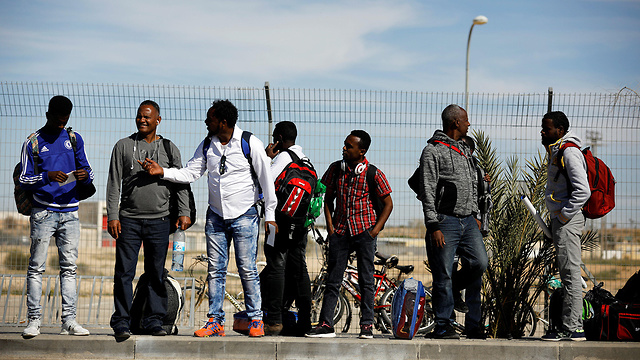
Netanyahu struggling to find new, legal solution for Africans
'Not only did Netanyahu go back on an excellent agreement, he actually admitted Israel is having a hard time offering legal solutions at would be in line with High Court of Justice rulings,' says government official dealing with the matter; PM is considering law that would bypass High Court.
"Not only did Netanyahu go back on an excellent agreement, which should've solved Israel's problem vis-à-vis half of the work migrants, he actually admitted Israel is having a hard time offering legal solutions that would be in line with High Court of Justice rulings," said an official dealing with the matter.
"Now he's placing the responsibility for this upon the High Court's shoulders again, without having good, effective and legal answers himself."
Netanyahu has been considering bringing a bill proposal to the government's approval that would bypass the High Court's ruling. One of the options on the table is including a "cessation clause," which would allow the Knesset to pass a law that cannot be annulled by the High Court.
But political sources say the prime minister has not yet made up his mind on the matter.
Finance Minister Moshe Kahlon has signaled he was willing to support any proposal by Netanyahu to resolve the problem, including legislation to bypass the High Court.
"If Netanyahu wants, we can pass this law tomorrow and solve the infiltrators problem," a source close to Kahlon said.
Education Minister Naftali Bennett, who was among those who pressured Netanyahu to nix the UN outline, also expressed his support of the prime minister.
"As we said many times, we support passing the Law for the Prevention of Infiltration anew with the cessation clause to prevent the High Court from striking it down again," Bennett said. "This will create an incentive for the infiltrators to leave Israel."
Different government bodies dealing with the issue—the National Security Council and the ministries of interior, public security and justice—held consultations on Monday in an effort to create a new, legal outline to resolve the problem, which will be presented to the High Court.
Inside officials stressed the problem has now been exacerbated. Primarily, Israel would have to reexamine the legality of detaining asylum seekers at the Saharonim Prison. They were imprisoned under the assumption this would be a temporary solution until their deportation. But now, with no concrete solution on the horizon, it is unclear if the asylum seekers can legally be held in Saharonim.
In addition, Netanyahu has officially declared one of the "third" countries taking in the deportees has failed to provide them with security, so now Israel would have to examine whether the other countries the deportees were supposed to be sent to are safe for them, otherwise the High Court would not authorize sending the asylum seekers there.
"Instead of declaring to the High Court and international human rights organizations that Israel has solved the problem of 16,000 deportees, the state is now left with some 40,000 immigrants whose problem we don't know how to solve," a government official said. "It's unclear now how we could reestablish the option to deport them to other African nations."
To that end, the state asked the High Court for a one-day extension to declare its position on the release of refugees from Saharonim.
"The topic is now awaiting the attorney general's decision. In light of the developments that occurred in the last few hours, the attorney general requires a short amount of time to complete his dialogue with the prime minister, the interior minister and other relevant bodies before the state can submit its position," the request said.
Telem Yahav contributed to this story.












